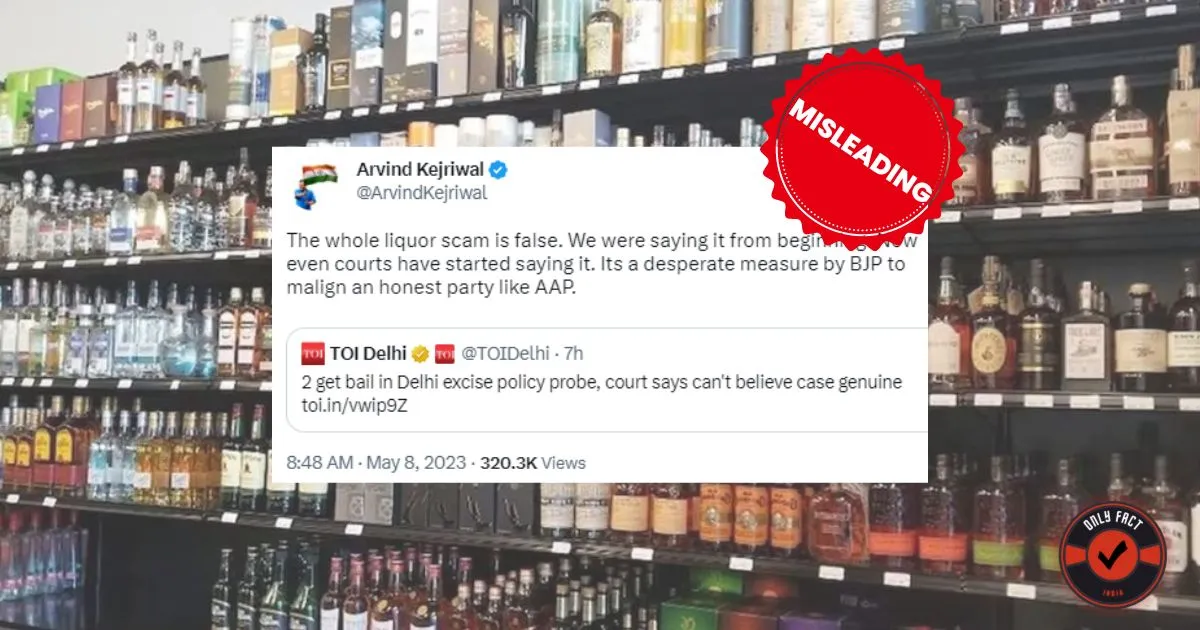Delhi CM Arvind Kejriwal Sent to CBI Custody in Excise Policy Scam Case
A Delhi court on June 26 sent Delhi Chief Minister Arvind Kejriwal to the custody of the Central Bureau of Investigation (CBI) for three days. The court’s decision came just hours after Kejriwal’s arrest in connection with a corruption case related to the alleged excise policy scam. This move marks a significant turn in the ongoing investigation into the 2021-2022 Delhi excise policy, which has been mired in controversy and allegations of procedural irregularities.

Source: Moneycontrol
Court Proceedings
Special Judge Amitabh Rawat cited the findings of the investigation, Kejriwal’s alleged involvement, and the necessity to confront him with evidence as reasons for the decision. However, Judge Rawat cautioned the CBI against being “overzealous” in their efforts. He emphasized that while the investigation is the prerogative of the CBI, certain legal safeguards must be adhered to. The judge underscored that, based on the material on record, the arrest could not be deemed illegal at this stage of the case.
Background of the Case
The Delhi Excise Policy 2021-2022 was introduced in November 2021 to revolutionize the liquor retail landscape in the capital. The policy aimed to maximize revenue, combat the sale of counterfeit alcohol, and enhance the consumer experience. However, the policy was scrapped on August 1, 2022, following allegations of procedural irregularities. Subsequently, federal law enforcement agencies, including the CBI and the Enforcement Directorate (ED), began probing the alleged scam.
The ED is investigating the alleged money trail under the Prevention of Money Laundering Act (PMLA), while the CBI is focused on corruption and bribery charges against public servants. On March 21, Kejriwal was arrested by the ED on money laundering charges. In May, the agency filed its first charge sheet naming Kejriwal and the Aam Aadmi Party (AAP) as accused in the case. The nearly 200-page document alleged that Kejriwal was directly involved in formulating the excise policy and demanded kickbacks amounting to ₹100 crore from the “South Liquor Lobby”—a group of influential individuals from South India who secured undue favors to establish wholesale businesses.
Legal Arguments
During the court proceedings, CBI Special Public Prosecutor D.P. Singh argued that Kejriwal’s custodial interrogation was necessary as the investigation had reached a crucial stage. He pointed out that the agency had refrained from arresting Kejriwal earlier, referring to the period when the Chief Minister was granted interim bail by the Supreme Court to campaign in the Lok Sabha polls. Singh asserted that concluding the investigation by July 3 was now imperative.
In the remand application, the CBI described Kejriwal as “one of the main conspirators of the criminal conspiracy” and alleged that Vijay Nair, AAP’s former communications-in-charge, had been contacting various liquor manufacturers and traders, demanding undue gratification since March 2021. The agency further claimed that AAP received ₹100 crore as kickbacks, of which ₹45 crore was allegedly utilized in AAP’s 2022 Goa election campaign.
Kejriwal’s Defense

Source: Only Fact
Countering these allegations, Kejriwal appeared in person before the court and accused the CBI of manipulating the media to create a wedge within the party leadership, particularly between him and former Delhi Deputy Chief Minister Manish Sisodia. “I have never testified that Manish Sisodia is guilty in this matter. He is innocent, and the entire AAP is innocent. I am innocent,” Kejriwal asserted. He claimed that the agency was attempting to defame the party through media leaks.
Kejriwal’s lawyers also refuted the necessity of his remand, pointing out that his name did not figure in any of the CBI charge sheets. They challenged the legality of the arrest, highlighting that no Section 41 notice was given under the Code of Criminal Procedure (CrPC) to appear for questioning.
Remand Order and Conditions
While remanding Kejriwal to three days of CBI custody, Judge Rawat emphasized that the investigation is the prerogative of the investigating agency and that the arrest could not be deemed illegal at this stage. The court also permitted Kejriwal’s lawyer and wife to meet him for an hour every day from 6 p.m. to 7 p.m. Additionally, the court directed that Kejriwal should receive a medically prescribed diet or home-cooked food while in police custody and must be provided with prescribed medicines and a glucometer throughout the remand period.
Implications and Next Steps
The arrest and subsequent remand of Chief Minister Arvind Kejriwal have significant political and legal implications. This development comes just days after the Delhi High Court stayed the bail granted to Kejriwal by the trial court in a related money laundering case. Senior advocate A.M. Singhvi, representing Kejriwal, informed the Supreme Court of his intent to return with a fresh challenge against the High Court’s final verdict, which stayed the bail order for not adequately appreciating the evidence advanced by the ED.
The ongoing investigations by the CBI and ED continue to cast a shadow over the Aam Aadmi Party, with allegations of corruption and money laundering at the forefront. The outcome of these investigations and the subsequent legal battles will likely have far-reaching consequences for both the party and its leadership.
As the investigation progresses, all eyes will be on the developments in the case and the potential impact on the political landscape in Delhi. The arrest of a sitting Chief Minister in such a high-profile case underscores the complexities and challenges of navigating legal and political accountability in contemporary India.
Read Also:
Right Wing Influencer Ajeet Bharti In Trouble For His “Journalism”





















































































